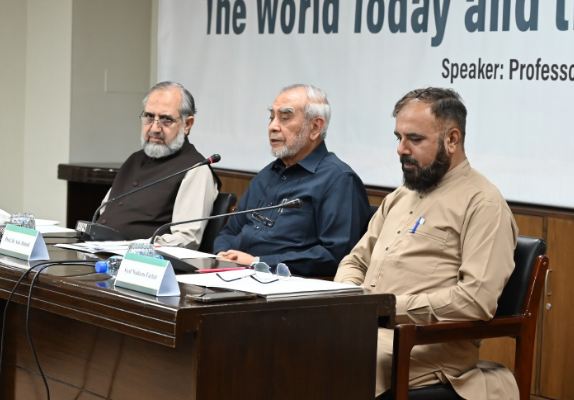DNA
ISLAMABAD, APR 25: Globalization today reflects a modern form of neocolonialism deeply embedded in global institutions, media, and academia. These domains serve as key instruments for the continued projection of hegemonic narratives and expansive global influence, which undermine intellectual independence, distort social structures, and reduce human interaction to self-centered individualism. To truly decolonize their minds, souls, and even territories, the Muslims must return to their original sources of knowledge and embrace learning processes that nurture critical thinking.
Prof. Dr. Anis Ahmad, renowned scholar and founding vice chancellor of Riphah International University, observed this while addressing the inaugural lecture of a series titled “The World Today and the Future of Humanity” at the Institute of Policy Studies (IPS). The six-part series has been organized in collaboration with the Markfield Institute of Higher Education, UK, and the International Islamic University Malaysia (IIUM) to foster informed debate on the evolving intellectual and ideological challenges the Muslim world faces today. Dr. Thameem Ushama from IIUM and Yousuf Farooq from the Islamic Foundation, UK, also joined the session.
While cautioning against superficial solutions, Dr. Anis said the prevailing global environment cultivates a fear of the unknown, undermining confidence-building and intellectual independence. As such, intellectual identities have been shaped by the dominant paradigms, frameworks that often obstruct, rather than facilitate, genuine transformation. Consequently, people respond to greater evils with lesser evils instead of initiating a meaningful paradigm shift.
For the Muslim Ummah, rediscovering its epistemological foundations is imperative. How people define, pursue, and value knowledge shapes their worldview. The Islamic tradition views knowledge not as a human creation but as a divine endowment from Allah. Therefore, humanity’s role is to receive, transmit, and act upon this knowledge with responsibility.
This understanding provides an ethical lens through which all phenomena must be evaluated. Concepts such as ma‘rifah (spiritual knowledge), hikmah (wisdom), and hidayah (divine guidance) carry profound messages that shape the moral and intellectual bearings of the Muslims. These, he asserted, must form the basis for a renewed intellectual and moral vision capable of addressing contemporary challenges.
“This is a world of media – where fast knowledge is treated like fast food,” Dr. Anis said, critiquing the superficial learning driven by digital media and global narratives.
He observed that while language is a fundamental communication tool, it must be complemented by a deeper understanding of the human psyche, which is an inherently holistic pursuit. Human dignity and integrity must remain central and intact in collectivist or individualist contexts.
Dr. Anis also warned against the growing dominance of individualism. “The nucleus has shifted from collectivism to individualism, with grave consequences for society,” he observed, connecting this shift to postmodern thinking. This leads to far-reaching consequences, especially for family life. Even the most traditional family structures are now affected, and since the family is the basic unit that makes or unmakes society, the implications are profound.
Despite outlining several challenges, Dr. Anis concluded on a hopeful note. “Although complete objectivity may be impossible, critical thinking is always possible,” he said, encouraging a renewed emphasis on intellectual accountability, inquiry, and purposeful optimism.

















